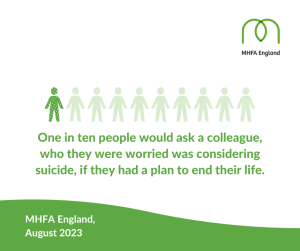 Article by Alicia Nagar, Head of People, Wellbeing and Equity, Mental Health First Aid England®
Article by Alicia Nagar, Head of People, Wellbeing and Equity, Mental Health First Aid England®
Figures from the Office for National Statistics found that in 2021, there were 5,583 suicides registered in England and Wales. That is approximately 115 people dying by suicide each week. Alongside this, Hazards Campaign research found as many as 10% of suicides in the UK each year could be work-related.
This month, along with thousands of organisations across the country, MHFA England marked World Suicide Prevention Day. Whilst the day provides workplaces with an opportunity to consider how they can play their part in preventing suicides, health and safety, business and HR leaders should strive to keep these conversations going 365 days a year.
Despite positive shifts in how we talk about mental health at work and in wider society, suicide is still stigmatised. In research MHFA England published ahead of World Suicide Prevention Day, we found that a third (33%) of employees would speak to their manager if
they were experiencing poor mental health but less than 1 in 5 (19%) would discuss having suicidal thoughts. The top reasons were, not feeling comfortable (61%), being worried it would impact their job (36%) or that they would be judged (35%).

Amidst a global pandemic, economic uncertainty, and changes to the ways we work, the need to support everyone’s mental health and wellbeing has never been greater. It is critical that organisations evaluate the role they play in preventing suicides. Workplaces should look to embed suicide awareness, prevention, and support into their mental health and wellbeing strategies. We need to support people having thoughts of suicide and ensure effective care is available for anyone impacted by suicide.
Identifying employees at risk of suicide is complex. Most of the time there isn’t one event or factor that leads someone to take their own life. It is usually a combination of factors interacting with each other. We do know, however, that suicide is more common amongst some groups than others.
ONS data shows that male suicide rates were nearly 3 times higher than the rate of female suicides in England in 2021. Alongside this, workers in construction are now nearly four times more likely to die by suicide than in any other sector. Recognising and understanding the risk factors that may be prevalent in your industry can help you create targeted suicide prevention strategies.
In creating safe working cultures, we should also remember that people with particular identities or backgrounds can be at higher risk of suicide. For example, research from Samaritans shows us that People of Colour and Black people have a higher risk of suicide. This is, in part, due to factors felt more keenly by this group. This includes social isolation, inequality and discrimination.
We also know that the risk of self-harm and suicide is higher among LGBTQ+ communities. This is not because being LGBTQ+ increases your risk, but because many LGBTQ+ people experience additional stressors including discrimination and barriers to seeking help. To tackle the rising numbers of suicide, we must also work to end these inequalities.
At MHFA England we want to support leaders and workplaces put clear, actionable plans in place to support those having thoughts of suicide and those impacted by suicide. These are our recommendations:
Build on what you have
Do not be disheartened or fearful of creating a ‘new’ suicide prevention strategy, on top of your wellbeing one. Having worked with over 20,000 organisations, delivering mental health training and consultancy, we know that many workplaces already have effective mental health and wellbeing strategies in place, including training people in mental health first aid. Creating cultures where staff feel psychologically safe, can speak freely about mental health, and seek support when needed are key to supporting suicide prevention.
If you want to build on these foundations, you might like to consider offering Suicide First Aid training. Our Suicide First Aid training provides people with a greater understanding of suicide, including how to spot the signs of someone who may be thinking about suicide and the confidence to intervene and help create a suicide safety plan.
We know that people don’t feel confident having conversations in the workplace about suicide. A third of people we surveyed thought, incorrectly, that asking about suicide could put the idea into someone’s head. The opposite is true. With the right training, we can all be brave enough to ask the question, ‘are you thinking about ending your life?’ It could save a life.
Alongside training, organisations should ensure that regular catchups between managers and employees are enshrined as part of workplace best practice. Discussing mental health and wellbeing, alongside objectives and performance, are an essential part of supporting people. Done well they can help managers spot signs of poor mental health early, and signpost to further help if necessary.
Just as with physical health, early intervention, diagnosis, and support are vital ways to help people protect their mental health and prevent issues getting worse. You can download MHFA England’s one-to-one template to help managers drive effective conversations.
Some organisations may only be at the start of the journey to support employee mental health, and that’s ok. It’s what you do next that is important. Culture change starts at the top. We must lead from the front to tackle stigma and ensure people come forward to access the support available.
Don’t wait until it’s too late
Sadly, lots of workplaces only consider suicide prevention and training when the worst has already happened. Early intervention and prevention must be at the heart of wellbeing strategies.
Employers need to listen to their people and respond to their concerns. For example, one of the greatest challenges to many people’s mental health this year has been increased economic uncertainty. Rapidly climbing household costs and the accompanying financial insecurity are having a direct impact on employee mental health.
Research from The Royal College of Psychiatrists shows one in two adults with debt experiences mental health issues. It also found that over 100,000 people in England attempt to take their own life, every year, whilst struggling with debt. Businesses should consider what can be put in place to support financial wellbeing and where to signpost people for support.
Alongside this, at MHFA England we have produced a new free resource, with advice on how to support someone experiencing suicide thoughts or behaviour. Placing this in communal areas in the workplace, or sharing the digital version with colleagues, shows your people that you are not afraid to talk about suicide and offer support.
Support after suicide
If an employee or someone close to the organisation dies by suicide, there will be a ripple effect. Research published by University College London found that people bereaved by the sudden death of a friend or family member are 65% more likely to attempt suicide if the deceased died by suicide than if they died by natural causes. Alongside this, Life in Mind found that up to 135 people could be affected by the death of someone who died by suicide. Employers can take action to help prevent crises, support survivors, and avoid putting at risk employees, at further risk.
Ensuring that your organisation has a support focused action and communication plan following suicide is key. Leaders should consider what resources are available such as access to trained health workers and mental health support services. If you have MHFAiders®, they may well see an increase in colleagues contacting them, so it is vital to engage with them to ensure they are also supported.
All MHFAiders trained by MHFA England have access to the MHFAider Support App® which includes access to a 24/7 text support service through Shout. This provides advice and reassurance following a mental health first aid conversation and supports wellbeing after a difficult conversation.
Remember, not all employees will be impacted in the same way. Grief can manifest differently. Don’t put a time frame on it and remember that flexibility and patience are vital as employees come to terms with loss.
Be particularly mindful of anniversaries or milestones that may be difficult for staff. Keeping an open, respectful conversation going around these periods and regularly sharing the support that is available is key.
You’re not alone
No matter your starting point, we are there, every step of the way, supporting you to support your people.
In addition to our training, we offer a range of bespoke consultancy services to help support business leaders to develop and deliver actionable, achievable mental health and wellbeing strategies.


If you’d like to find out more about how we can support you, please email workplace@mhfaengland.org or visit mhfaengland.org

